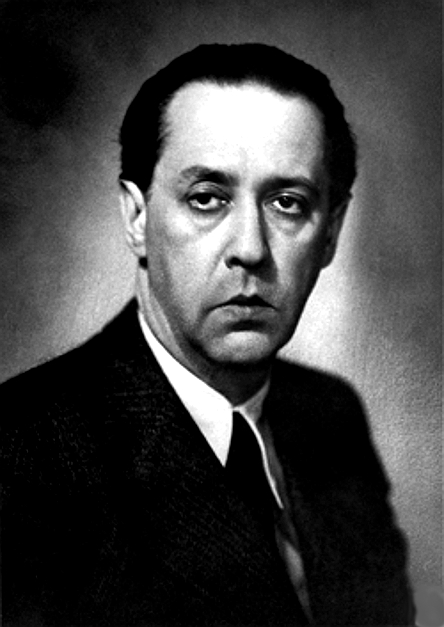Sándor Márai
Sándor Márai is among the most important modern Hungarian authors, whose works have been translated heavily into Spanish and now, becoming known in English.
Born April 11, 1900, in Kassa, Hungary (Kosice, Slovakia)
Died February 22, 1989, in San Diego, California
- Novelist, short-story writer, journalist.
- Articles under pseudonyms began to appear while in gymnasium.
- During 1930s contributed to many West European periodicals and became a best-selling author.
- Viewed problems of 1930s humanistically and opposed fascism.
- “Kaland” presented by Nemzeti Kamara Színház in 1940 for nearly a year, and “A kassai polgárok” premiered by National Theater in 1942.
- After 1945 he was staff member of Magyar Nemzet.
- Became United States citizen in 1957.
- Married Lola Matzner in 1923, with whom he had a son, Kristof who died just after birth. Adopted Janos.
- Most important and influential representative of middle-class literature in period between two World Wars, especially in his novels.
- Not a reformer but a portrayer of human problems and struggles through psychological examination.
- Probes innermost parts of human nature. Lyrical and intuitive delineation of characters results in relatively plotless novels. Style symbolic, not realistic.
- Often praised for ability to rise above narrow nationalism and provincialism.
- Wrote two movies, Szerep (1993) and Alibi (1993).
- “Zendülok” has been translated into French; “Csutora” into Czech and German; “Idegen emberek” into Czech, Dutch, and German; “A szegények iskolája”, “A gyertyák csonkig égnek”, “Kassai polgárok”, “A sirály”, and “Kaland” into German; “Válás Budán” into Czech, German, and Spanish; “Féltékenyek” into Dutch, German, and Turkish; “Vendégjáték Bolzanóban” into Czech, Dutch, German, Italian, Spanish, and Swedish; and some of his short stories into Bulgarian, Czech, French, German, Italian, Polish, Russian, Slovakian, and Turkish.
- Committed suicide in 1989.
Translated into English
- The Rebels (1930, published in English in 2007), Hungarian title: A zendülők.
- Esther’s Inheritance (1939, published in English in 2008), Hungarian title: Eszter hagyatéka.
- Casanova in Bolzano (1940, published in English in 2004), Hungarian title: Vendégjáték Bolzanóban
- Portraits of a Marriage (1941 & 1980, published in English in 2011), Hungarian titles: Az igazi (1941) and Judit… és az utóhang (1980)
- Embers (1942, published in English in 2001), Hungarian title: A gyertyák csonkig égnek
- Memoir of Hungary (1971, published in English in 2001), Hungarian title: Föld, föld…!
is among the most important modern Hungarian authors, whose works have been translated heavily into Spanish and now, becoming known in English.
Born April 11, 1900, in Kassa, Hungary (Kosice, Slovakia)
Died February 22, 1989, in San Diego, California
- Novelist, short-story writer, journalist.
- Articles under pseudonyms began to appear while in gymnasium.
- During 1930s contributed to many West European periodicals and became a best-selling author.
- Viewed problems of 1930s humanistically and opposed fascism.
- “Kaland” presented by Nemzeti Kamara Színház in 1940 for nearly a year, and “A kassai polgárok” premiered by National Theater in 1942.
- After 1945 he was staff member of Magyar Nemzet.
- Became United States citizen in 1957.
- Married Lola Matzner in 1923, with whom he had a son, Kristof who died just after birth. Adopted Janos.
- Most important and influential representative of middle-class literature in period between two World Wars, especially in his novels.
- Not a reformer but a portrayer of human problems and struggles through psychological examination.
- Probes innermost parts of human nature. Lyrical and intuitive delineation of characters results in relatively plotless novels. Style symbolic, not realistic.
- Often praised for ability to rise above narrow nationalism and provincialism.
- Wrote two movies, Szerep (1993) and Alibi (1993).
- “Zendülok” has been translated into French; “Csutora” into Czech and German; “Idegen emberek” into Czech, Dutch, and German; “A szegények iskolája”, “A gyertyák csonkig égnek”, “Kassai polgárok”, “A sirály”, and “Kaland” into German; “Válás Budán” into Czech, German, and Spanish; “Féltékenyek” into Dutch, German, and Turkish; “Vendégjáték Bolzanóban” into Czech, Dutch, German, Italian, Spanish, and Swedish; and some of his short stories into Bulgarian, Czech, French, German, Italian, Polish, Russian, Slovakian, and Turkish.
- Committed suicide in 1989.
Translated into English
- The Rebels (1930, published in English in 2007), Hungarian title: A zendülők.
- Esther’s Inheritance (1939, published in English in 2008), Hungarian title: Eszter hagyatéka.
- Casanova in Bolzano (1940, published in English in 2004), Hungarian title: Vendégjáték Bolzanóban
- Portraits of a Marriage (1941 & 1980, published in English in 2011), Hungarian titles: Az igazi (1941) and Judit… és az utóhang (1980)
- Embers (1942, published in English in 2001), Hungarian title: A gyertyák csonkig égnek
- Memoir of Hungary (1971, published in English in 2001), Hungarian title: Föld, föld…!
Copyright © 2024 Hungarian Bookstore - All Rights Reserved.
We are an Amazon affiliate, and your purchases help defray our costs.
Site Design by Trendl Communications Creative Websites
Read: The Raging Giant Blue Goldfish - 22 Short Stories
We are an Amazon affiliate, and your purchases help defray our costs.
Site Design by Trendl Communications Creative Websites
Read: The Raging Giant Blue Goldfish - 22 Short Stories


